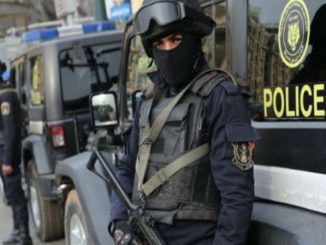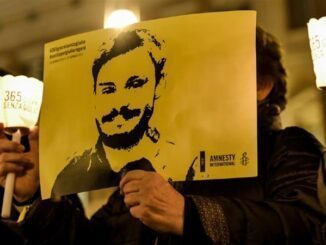
Egyptian security forces have reportedly launched a new arrest campaign against activists in various cities, ignoring calls for the release of detainees made by international human rights organizations due to the fear of spreading the novel coronavirus in overcrowded prisons.
The Egyptian Coordination for Rights and Freedoms, a civil society organization operating in Egypt, said that security forces in the Kafr El Sheikh governorate had launched a campaign targeting residents despite calls by activists to release detainees because of the spread of the coronavirus, known officially as Covid-19, reported London-based Al-Araby Al-Jadeed newspaper.
The Office of the United Nations High Commissioner for Human Rights (OHCHR) has estimated that there are more than 114,000 detainees held in Egypt’s prisons.
OHCHR spokesperson Robert Colville called on Egyptian authorities to release detainees due to fears of Covid-19 infections in prisons after a number of other countries had released detainees convicted of non-violent crimes and people in pre-trial detention, who make up about a third of prisoners.
Detained researcher in critical condition
Amnesty yesterday demanded release of human rights researcher Ibrahim Ezz El-Din who remains in pre-trial detention following his arrest on 11 June 2019.
Detained human rights researcher Ibrahim Ezz El-Din’s health has deteriorated in Tora prison putting him at particular risk if exposed to COVID-19. Ibrahim, who was arrested on 11 June 2019 and exposed to enforced disappearance for 167 days until his appearance in front of the Supreme State Security Prosecution on 26 November 2019.
Amnesty International yesterday, 9 April 2020 demanded immediate release of Ezz El-Din in a letter to Egyptian Public Prosecutor Hamada al-Sawi, asking everyone to take action and send similar letters to al-Sawi. The letter sent by Amnesty to the Egyptian public prosecutor reads as follows:
Dear counsellor,
Amid rising fears over the spread of coronavirus (COVID-19) in Egypt’s overcrowded prisons, the Egyptian authorities must immediately and unconditionally release Ibrahim Ezz el-Din, particularly as he suffers from chronic allergies that cause respiratory difficulties. This condition puts him at particular risk to the virus according to the World Health Organization’s list of vulnerable groups. He should not be in detention in the first place. Generally, Ibrahim’s poor health makes him more vulnerable to the effects of a virus like COVID-19. The well-documented concerns over overcrowded, unhygienic and unsanitary detention conditions in Egyptian prisons aggravate risks of the spread of COVID-19 infections.
On 20 February 2020, Ibrahim’s lawyer submitted a request to the Supreme State Security Prosecution for Ibrahim, who had attempted suicide, to receive adequate psychiatric help from experts outside the prison with costs covered by his family. The authorities denied the request. On 26 February, Ibrahim attempted suicide again.
According to medical professionals familiar with Ibrahim’s case, the systematic torture he endured while forcibly disappeared, in addition to systematic medical neglect by the Tora prison authorities, might have triggered his depression.
Ibrahim also suffers from an inflammation in his lumbar vertebrae, chronic allergies, and a fungal infection of the tongue developed due to poor conditions of detention. Ibrahim refuses to go to the prison hospital fearing infection after he heard that other prisoners have reportedly contracted hepatitis C while being treated there.
I urge you to release Ibrahim Ezz El-Din immediately and unconditionally given that his detention relates solely to his peaceful human rights work. As his health problems put him at increased risk from COVID-19, we call on you to ensure that, pending his release, he has access to adequate health care, including psychiatric services if needed. I also urge you to promptly undertake an effective investigation into his enforced disappearance and the alleged torture to which he has been subjected and bring to justice those suspected to be responsible in fair trials.
Yours sincerely,
Amnesty International has documented Egyptian security forces’ use of enforced disappearances as a tool against political activists and protesters, including students and children in Egypt. Hundreds of people forcibly disappeared were held with no access to their lawyers or families and no external judicial oversight. This pattern of abuse became particularly evident after President Abdel Fattah al-Sisi appointed Major-General Magdy Abd el-Ghaffar as Minister of Interior in March 2015. ECRF is one of the main Egyptian NGOs that has been working extensively on the issue of enforced disappearances.



